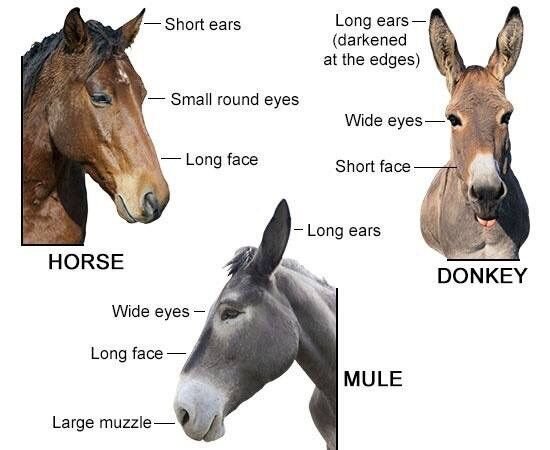Differences Between Horses, Donkeys, and Mules
Curated and posted by Bo Cruz
As I was surfing the web, I came across an article concerning our beloved "long ears" (written by an un-authored source) that I felt would be interesting to share with our Mule Train members who may or may not be aware.
Enjoy!
"Donkeys and mules are both equine animals. They share the same family with the horse. But in some ways, they are very different from each other.
How do you get a donkey?
Donkeys are born when a male and female donkey mate.
How do you get a mule?
A baby mule is born only when a female horse and a male donkey mate. Mules are almost always sterile, that is, they cannot have babies. When a male horse and female donkey mate, they produce a hinny. These animals look much like mules but are usually smaller because of the small womb size of donkeys.
Horses have 64 pairs of chromosomes while mules have 63, and donkeys have 62 pairs.
Gender names:
Male donkeys are called 'Jack'.
Female donkeys are called 'Jenny'.
Male mules are called 'John'.
Female mules are called 'Molly'.
Physical characteristics:
Mules are taller and bigger than donkeys as they partly come from a horse. Sometimes they can even be bigger than their donkey parent
Donkeys have very long ears. The ears of a mule are shaped like a horses but longer, though not as long as a donkey's
Donkeys have narrow hooves, while the hooves of a mule are harder than that of a horse
Mules are very similar to horses in their body shape, teeth and coat
Coat:
Mules are most often brown or bay coloured. They can also be grey or black, and sometimes even white, roans (both blue and red), palomino, dun, and buckskin.
The coat of a donkey is usually grey, but they can sometimes be dark brown, light-faced roan or black.
Moreover, donkeys have two stripes on their coat. One goes from the mane to the tail, while the other lies crosswise on the shoulder.
Mules and donkeys can vary in size and colour all over the world.
Sound they make:
Donkeys make a hee-haw sound, while the sound mules make is a cross between a horse's whinny and a donkey's hee-haw.
Life span:
The life span of a donkey is about 30-50 years while a mule's is around 30-40 years.
Are mules stubborn?
A 2013 study had found that mules are actually the most intelligent of our domestic animals. They are great problem solvers and have really good learning skills. So, they are not really stubborn, they take time to study a problem before taking any step. Donkeys are also quite intelligent, but not as much as mules.
Because of their steady footing and tendency to remain calm even when spooked, unlike horses, which can throw off riders, mules are the chosen animal to ride in the Grand Canyon."
Hope you enjoyed the article. Until next month. Happy Trails!!!

